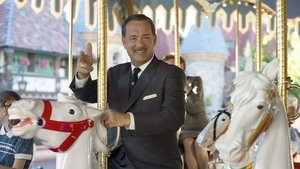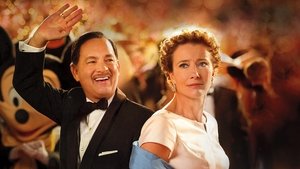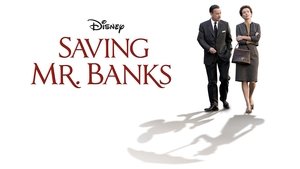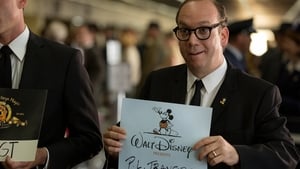The Academy Awards is certainly vain. The voting body is continually enamored with movies about the history of cinema. Needless to say, Disney's latest biographical feature, Saving Mr. Banks, which couples the legendary talents of Emma Thompson and Tom Hanks in the story of Walt Disney's exhausting efforts to acquire the rights to Mary Poppins, flaunts it's Oscar-baity agenda with dignified pride. My guess, the Academy will once again swoon over director John Lee Hancock's historical account.
When Walt Disney (Tom Hanks) made a promise to his daughters in the 1940s that he would bring their favorite literary character to the big screen, no one could have imagined the struggles he'd endure along the way. After two decades of begging author P.L. Travers (Emma Thompson) for the rights to her famed character, Mary Poppins, Walt brings the financially strapped author to Los Angeles. While there, he must discover the secrets behind the Banks' family and their whimsical nanny in order to entrust Mrs. Travers that her beloved character is in good hands.

John Lee Hancock has suddenly become the poster boy for sentimental biographical films. In 2009 he guided Sandra Bullock to a Best Actress statue alongside a Best Picture Nomination for his real-life adaptation of the Michael Oher story with The Blind Side. His knack for tugging at the audience's heartstrings returns once again in his latest endeavor, Saving Mr. Banks. Yet, Hancock's lucid game-plan isn't the glue that holds this film together, rather it's the Oscar-caliber performances from Emma Thompson and Tom Hanks that make it stick. With these two lifelong masters of their trade, we've been spoiled rotten, expecting nothing but greatness every time they appear on the screen. Luckily for Hancock, his duo delivers at the highest level imaginable, Hanks with his cheery friendliness and Thompson as an argumentative curmudgeon, which clearly elevates Saving Mr. Banks slightly beyond the realm of mediocrity.

Although the film is an indisputable success that will ultimately find itself in the awards season mix, Saving Mr. Banks is flooded with faults. I'll preface by saying that the feature contains a story that isn't overly elaborate, and nor does it need to be. However, along with director John Lee Hancock, writers Kelly Marcel and Sue Smith unfortunately milk everything they can out of this straightforward tale and transform the film into a ballooned 126-minute affair. Saving Mr. Banks meshes together two non-concurrent stories. One pertaining to the childhood of Emma Thompson's character, and the other paralleling those experiences with her "present-day" struggle of relinquishing the rights to Mary Poppins. The portion of the movie that examines P.L. Travers' youth becomes over-extended and nothing more than a weight on the film. Its purpose is understood, but its execution is lackluster. The "present-day" moments throughout Saving Mr. Banks are what the audience will love and remember. Unfortunately, these highlights are broken up in excess by a middling other half of the feature.
There exists a wondrous aura surrounding John Lee Hancock's Saving Mr. Banks. It's comedic elements are a bright complementing aspect to its dramatic nature. However, an abundance of sentiment and a slight mishandling of the story deter from the movie's otherwise glowing attributes. But thankfully, Thompson and Hanks dazzle just enough to keep that spark alive.
-
 NameEmma ThompsonCharacterP.L. Travers
NameEmma ThompsonCharacterP.L. Travers -
 NameTom HanksCharacterWalt Disney
NameTom HanksCharacterWalt Disney -
 NameColin FarrellCharacterTravers Robert Goff
NameColin FarrellCharacterTravers Robert Goff -
 NamePaul GiamattiCharacterRalph
NamePaul GiamattiCharacterRalph -
 NameRuth WilsonCharacterMargaret Goff
NameRuth WilsonCharacterMargaret Goff -
 NameJason SchwartzmanCharacterRichard Sherman
NameJason SchwartzmanCharacterRichard Sherman -
 NameBradley WhitfordCharacterDon DaGradi
NameBradley WhitfordCharacterDon DaGradi -
 NameAnnie Rose BuckleyCharacterGinty
NameAnnie Rose BuckleyCharacterGinty -
 NameB. J. NovakCharacterRobert Sherman
NameB. J. NovakCharacterRobert Sherman -
 NameKathy BakerCharacterTommie
NameKathy BakerCharacterTommie -
 NameLily BighamCharacterBiddy
NameLily BighamCharacterBiddy -
 NameMelanie PaxsonCharacterDolly
NameMelanie PaxsonCharacterDolly -
 NameAndy McPheeCharacterMr. Belhatchett
NameAndy McPheeCharacterMr. Belhatchett -
 NameRachel GriffithsCharacterAunt Ellie
NameRachel GriffithsCharacterAunt Ellie -
 NameRonan VibertCharacterDiarmuid Russell
NameRonan VibertCharacterDiarmuid Russell -
 NameFuschia SumnerCharacterFlight Attendant
NameFuschia SumnerCharacterFlight Attendant -
 NameDavid Ross PatersonCharacterDoctor
NameDavid Ross PatersonCharacterDoctor -
 NameLaura WaddellCharacterWoman with Infant
NameLaura WaddellCharacterWoman with Infant -
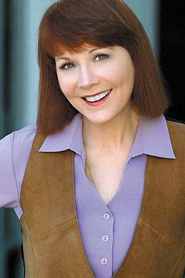 NameBarbara KeeganCharacterFlight Attendant
NameBarbara KeeganCharacterFlight Attendant -
 NameSteven CabralCharacterBank Clerk
NameSteven CabralCharacterBank Clerk -
 NameJerry HauckCharacterPremier Emcee
NameJerry HauckCharacterPremier Emcee -
 NameMichelle ArthurCharacterPolly
NameMichelle ArthurCharacterPolly -
 NameMichael SwinehartCharacterPorter
NameMichael SwinehartCharacterPorter -
 NameBob RuschCharacterDoorman
NameBob RuschCharacterDoorman -
 NamePaul TassoneCharacterRefreshment Tent Man
NamePaul TassoneCharacterRefreshment Tent Man -
 NameLuke BainesCharacterWaiter
NameLuke BainesCharacterWaiter -
 NameDemetrius GrosseCharacterBartender
NameDemetrius GrosseCharacterBartender -
 NameKim D'ArmondCharacterKatie Nanna
NameKim D'ArmondCharacterKatie Nanna -
 NameMia SerafinoCharacterYoung Woman
NameMia SerafinoCharacterYoung Woman -
 NameClaire BockingCharacterNanny Claire
NameClaire BockingCharacterNanny Claire -
 NameDendrie TaylorCharacterLillian Disney
NameDendrie TaylorCharacterLillian Disney -
 NameKristopher KyerCharacterDick Van Dyke (uncredited)
NameKristopher KyerCharacterDick Van Dyke (uncredited) -
 NameVictoria SummerCharacterJulie Andrews (uncredited)
NameVictoria SummerCharacterJulie Andrews (uncredited) -
 NameJaeden BettencourtCharacterYoung Child-1906 (uncredited)
NameJaeden BettencourtCharacterYoung Child-1906 (uncredited) -
 NameMelissa BickertonCharacterMrs. Corry (uncredited)
NameMelissa BickertonCharacterMrs. Corry (uncredited) -
 NameGinger PauleyCharacterJoyce Sherman (uncredited)
NameGinger PauleyCharacterJoyce Sherman (uncredited) -
 NameRhoda PellCharacterMrs. Belhatchett (uncredited)
NameRhoda PellCharacterMrs. Belhatchett (uncredited)
-
 NameSue SmithJobWriter
NameSue SmithJobWriter -
 NameThomas NewmanJobOriginal Music Composer
NameThomas NewmanJobOriginal Music Composer -
 NameJohn Lee HancockJobDirector
NameJohn Lee HancockJobDirector -
 NameKelly MarcelJobWriter
NameKelly MarcelJobWriter -
 NameTroy LumJobExecutive Producer
NameTroy LumJobExecutive Producer -
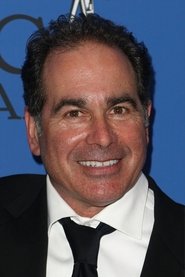 NameJohn SchwartzmanJobDirector of Photography
NameJohn SchwartzmanJobDirector of Photography -
 NamePhilip SteuerJobProducer
NamePhilip SteuerJobProducer -
 NameLauren E. PolizziJobArt Direction
NameLauren E. PolizziJobArt Direction -
 NameIan CollieJobProducer
NameIan CollieJobProducer -
 NameAlison OwenJobProducer
NameAlison OwenJobProducer -
 NameChristine LanganJobExecutive Producer
NameChristine LanganJobExecutive Producer -
 NamePaul TrijbitsJobExecutive Producer
NamePaul TrijbitsJobExecutive Producer -
 NameAndrew MasonJobExecutive Producer
NameAndrew MasonJobExecutive Producer -
 NameMark LivolsiJobEditor
NameMark LivolsiJobEditor -
 NameMichael CorenblithJobProduction Design
NameMichael CorenblithJobProduction Design -
 NameJessica DrakeJobDialect Coach
NameJessica DrakeJobDialect Coach -
 NameDaniel OrlandiJobCostume Design
NameDaniel OrlandiJobCostume Design -
 NameK.C. HodenfieldJobFirst Assistant Director
NameK.C. HodenfieldJobFirst Assistant Director -
 NameMatthew SullivanJobMusic Supervisor
NameMatthew SullivanJobMusic Supervisor -
 NamePhilip SteuerJobUnit Production Manager
NamePhilip SteuerJobUnit Production Manager -
 NameRichard M. ShermanJobMusic Consultant
NameRichard M. ShermanJobMusic Consultant -
 NameK.C. HodenfieldJobCo-Producer
NameK.C. HodenfieldJobCo-Producer -
 NameRonna KressJobCasting Director
NameRonna KressJobCasting Director -
 NameJeff OkabayashiJobSecond Assistant Director
NameJeff OkabayashiJobSecond Assistant Director -
 NameJohn PritchettJobSound Mixer
NameJohn PritchettJobSound Mixer -
 NameStephen ChristensenJobSet Designer
NameStephen ChristensenJobSet Designer -
 NameKate BiscoeJobKey Makeup Artist
NameKate BiscoeJobKey Makeup Artist -
 NameLauren MiyakeJobVisual Effects Producer
NameLauren MiyakeJobVisual Effects Producer -
 NameValerie LawsonJobThanks
NameValerie LawsonJobThanks -
 NameDaniel D. HarrisJobIn Memory Of
NameDaniel D. HarrisJobIn Memory Of -
 NameJon JohnsonJobSupervising Sound Editor
NameJon JohnsonJobSupervising Sound Editor -
 NamePeter Ronald OwenJobIn Memory Of
NamePeter Ronald OwenJobIn Memory Of -
 NameFrances MathiasJobHair Designer
NameFrances MathiasJobHair Designer -
 NameCatherine ChildersJobKey Hair Stylist
NameCatherine ChildersJobKey Hair Stylist -
 NameVanessa LapatoJobSupervising Dialogue Editor
NameVanessa LapatoJobSupervising Dialogue Editor -
 NameMary Ann KelloggJobChoreographer
NameMary Ann KelloggJobChoreographer -
 NameSusan BenjaminJobSet Decoration
NameSusan BenjaminJobSet Decoration -
 NameBill BernsteinJobSupervising Music Editor
NameBill BernsteinJobSupervising Music Editor -
 NameSteven SwansonJobVisual Effects Producer
NameSteven SwansonJobVisual Effects Producer -
 NameJ.D. SchwalmJobSpecial Effects Coordinator
NameJ.D. SchwalmJobSpecial Effects Coordinator -
 NameJustin JohnsonJobDigital Effects Supervisor
NameJustin JohnsonJobDigital Effects Supervisor -
 NameLorrie CampbellJobSet Designer
NameLorrie CampbellJobSet Designer -
 NameSimon MowbrayJobVisual Effects Supervisor
NameSimon MowbrayJobVisual Effects Supervisor -
 NameFrances MathiasJobHair Department Head
NameFrances MathiasJobHair Department Head -
 NameSally ThorntonJobSet Designer
NameSally ThorntonJobSet Designer -
 NameVincent CirelliJobVisual Effects Supervisor
NameVincent CirelliJobVisual Effects Supervisor -
 NameTina L. NewmanJobProduction Executive
NameTina L. NewmanJobProduction Executive -
 NameBen SmithardJobAdditional Director of Photography
NameBen SmithardJobAdditional Director of Photography








